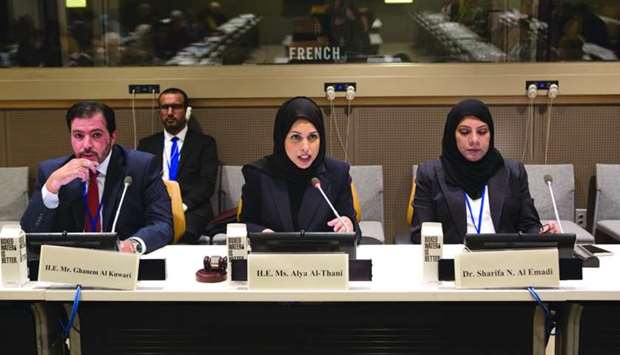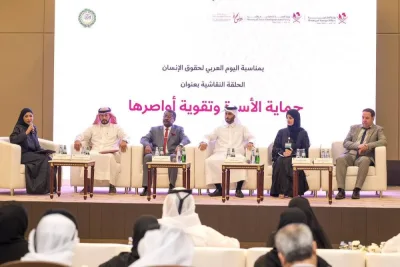Ways of tackling a lack of affordable and adequate housing for families has been placed in the spotlight at the United Nations, through Doha International Family Institute's (Difi) annual Doha Briefing.
"Social protection policies play an important role in addressing family wellbeing, as well as tackling the lack of adequate and affordable housing structures," said Dr Sharifa Noaman al-Emadi, executive director, Difi, speaking at United Nations headquarters.

"Such policies have the untapped potential to contribute to the achievement of development goals at a national, regional, and global level. We joined other countries though our Doha Briefing to discuss the challenges faced in addressing the assurance of, and access to, adequate and affordable housing and its impact on family wellbeing, and put forward endorsed measures to facilitate the access to affordable housing.
"Difi also aimed to identify the challenges facing parents during these changing times, including familial conflict and housing instability, and highlighting solutions towards family stability and cohesion, such as investing in parenting programmes."
The Qatar Foundation member's briefing in New York was held at the 58th session of the Commission for Social Development, titled 'Affordable housing and social protection systems for all to address homelessness', and focused on how access to housing and social protection systems are vital to nurturing strong and stable families.
Held in collaboration with the Permanent Mission of Qatar, the briefing's first session was held in collaboration with the United Nations (UN), the Division for Inclusive Social Development within the UN Department of Economic and Social Affairs (UNDESA) and Qatar's Ministry of Administrative Development, Labour and Social Affairs.
Participants were welcomed by Qatar’s Permanent Representative to the UN ambassador HE Sheikh Alya Ahmed bin Saif al-Thani, with the session being moderated by Renata Kaczmarska, Focal Point on the Family within the Social Inclusion and Participation Branch in UNDESA's Division for Inclusive Social Development Department of Economic and Social Affairs.
Speakers included HE Ghanem Mubarak al-Kuwari, assistant undersecretary for social affairs, Ministry of Administrative Development, Labour and Social Affairs, who gave a presentation on 'The state's Role in Protecting Family Cohesion by Providing Housing Care: Regulations, Policies, Priority'.
Dr Susan Roylance, director, International Policy, United Families, spoke about families and housing instability in the context of the UN's Sustainable Development Goals, with Difi researcher Ahmed Aref's presentation focusing on the case for family-sensitive social protection.
The second session of the Doha Briefing was organised by Difi in collaboration with the Permanent Mission of Qatar to the UN, Unicef and the International Federation for Family Development (IFFD)under the theme of 'Families and Housing Instability: Investing in Parenting Programmes'. It explored how housing instability can affect family cohesion and child wellbeing, highlighted the housing challenges facing parents, and advocated for policies and programmes that can support parents in safeguarding their children.
After opening remarks by Dr al-Emadi, the side event - moderated by Ignacio Socias, director of communications, IFFD - heard the perspectives of Dr Froma Walsh, co-director and co-founder of the Chicago Center for Family Health, on family resilience and housing instability; and Chemba Raghavan, Early Childhood Development Specialist, Unicef, as she discussed the need for family-friendly policies that reduce the impact of poverty on children.
The session concluded with Dana al-Kahlout, senior programme specialist at Difi, giving a presentation outlining the case for investing in parenting programmes.

Difi researcher Ahmed Aref at the session
"Such policies have the untapped potential to contribute to the achievement of development goals at a national, regional, and global level. We joined other countries though our Doha Briefing to discuss the challenges faced in addressing the assurance of, and access to, adequate and affordable housing and its impact on family wellbeing, and put forward endorsed measures to facilitate the access to affordable housing.
"Difi also aimed to identify the challenges facing parents during these changing times, including familial conflict and housing instability, and highlighting solutions towards family stability and cohesion, such as investing in parenting programmes."
The Qatar Foundation member's briefing in New York was held at the 58th session of the Commission for Social Development, titled 'Affordable housing and social protection systems for all to address homelessness', and focused on how access to housing and social protection systems are vital to nurturing strong and stable families.
Held in collaboration with the Permanent Mission of Qatar, the briefing's first session was held in collaboration with the United Nations (UN), the Division for Inclusive Social Development within the UN Department of Economic and Social Affairs (UNDESA) and Qatar's Ministry of Administrative Development, Labour and Social Affairs.
Participants were welcomed by Qatar’s Permanent Representative to the UN ambassador HE Sheikh Alya Ahmed bin Saif al-Thani, with the session being moderated by Renata Kaczmarska, Focal Point on the Family within the Social Inclusion and Participation Branch in UNDESA's Division for Inclusive Social Development Department of Economic and Social Affairs.
Speakers included HE Ghanem Mubarak al-Kuwari, assistant undersecretary for social affairs, Ministry of Administrative Development, Labour and Social Affairs, who gave a presentation on 'The state's Role in Protecting Family Cohesion by Providing Housing Care: Regulations, Policies, Priority'.
Dr Susan Roylance, director, International Policy, United Families, spoke about families and housing instability in the context of the UN's Sustainable Development Goals, with Difi researcher Ahmed Aref's presentation focusing on the case for family-sensitive social protection.
The second session of the Doha Briefing was organised by Difi in collaboration with the Permanent Mission of Qatar to the UN, Unicef and the International Federation for Family Development (IFFD)under the theme of 'Families and Housing Instability: Investing in Parenting Programmes'. It explored how housing instability can affect family cohesion and child wellbeing, highlighted the housing challenges facing parents, and advocated for policies and programmes that can support parents in safeguarding their children.
After opening remarks by Dr al-Emadi, the side event - moderated by Ignacio Socias, director of communications, IFFD - heard the perspectives of Dr Froma Walsh, co-director and co-founder of the Chicago Center for Family Health, on family resilience and housing instability; and Chemba Raghavan, Early Childhood Development Specialist, Unicef, as she discussed the need for family-friendly policies that reduce the impact of poverty on children.
The session concluded with Dana al-Kahlout, senior programme specialist at Difi, giving a presentation outlining the case for investing in parenting programmes.



